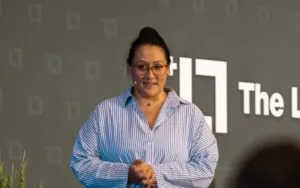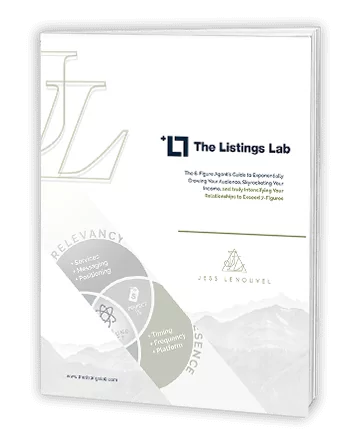Energy management is more important than time management for real estate agents…and here’s why.
Sure, we’ve all heard the expression “time is money”.
But there’s one more resource that’s even more precious than time as a real estate CEO…
And that’s your energy.
Energy Management > Time Management For Real Estate Agents
Your energy is the lifeblood of your business. It’s what steers the ship forward and motivates everyone on your team to keep carrying out your vision.
Focusing on time management as a real estate agent instead of energy management is a HUGE blindspot and will significantly hinder your ability to scale your business.
So the question is…
Are you ready to properly harness your energy so you can grow a powerhouse real estate business?
The first step is what I like to call an energy audit. Here’s why it’s something you should implement to master your energy!
Energy Audit For Real Estate Agents – 4 Domains To Consider
Here’s why performing an energy audit is going to be a game changer for your business…and so much more powerful than typical time management tips for real estate agents.
Energy isn’t bound by time. People can spend a lot of time and energy on things they love, and it doesn’t drain them.
Happy people who love their business are people who maximize their energy. Doing this will change your relationship with your work and how you operate within your business. There are far too many agents spending too much time doing things they hate. When that happens, everyone in your life suffers. Your business suffers. Your clients suffer. No one is getting your best.
I know this far too well…because it’s exactly what happened to me.
You want to elevate your energy so that you can have the biggest possible impact on your community, your family, and your business. You can do this by auditing your energy and organizing the tasks in your business into what I call the four different “domains of energy.”
There are four different domains of energy, and they are as follows:
- Your Gravitational Energy Domain
- Your Inertial Energy Domain
- Your Potential Energy Domain
- Your Kinetic Energy Domain
Let’s get into each one and what they mean for your energy audit!
Gravitational Energy Domain
First up, we’ve got your gravitational energy domain. You’re likely good at many things, great at a more limited number, and only a true expert in a few areas. This is true for everyone.
Also, like everyone, you have areas and tasks you don’t like doing, and you’re not great at either. But chances are, you’re spending a lot of time on them anyway. These tasks weigh you down like gravity, demoralize you, and keep you from unlimited upward mobility.
You should never engage in these “Gravitational Domain” tasks. They vary by person, but often they include administrative work—paperwork, financials—the tiny details on the backend of things.
Personally? My Gravitational Domain includes things like bookkeeping, which I absolutely hate and I’m also terrible at.
So many agents want to be the master of everything in their business. They want to have a finger in every pie.
But in reality, this is a recipe for disaster and burnout.
If the thought of being inept at things or not having access to everything makes you feel uncomfortable, your ego account is cashing checks.
It’s okay for people on your team to be better than you at things. That’s just a part of growth. Embrace it. There’s a reason that Jeff Bezos doesn’t pack boxes in the Amazon warehouse.
Inertial Energy Domain
Almost worse than not being good at something and not liking it is being good at something that you hate doing. Again, everybody has these types of tasks. I can create a spreadsheet if I really have to, but I despise creating them. On the other hand, my COO’s eyes light up when she gets to create a new resource to keep the team organized.
The tasks you’re doing to keep the business going (but not growing) are in the “Inertial Domain.” If you think back to high-school science, inertia is the tendency of objects in motion to stay in motion at the same speed unless an outside force acts on them.
The reason you’re inefficient at these tasks is that human brains are wired naturally to steer us away from pain. It’s the same impulse that lets you know if you’ve accidentally put your hand on a hot burner.
Our brains don’t like us to do things that make us physically, mentally, or emotionally uncomfortable for longer than is absolutely necessary. When we do, they will always try to distract us.
And usually, they succeed. This is when shiny objects look their shiniest. Instead of working on the design of that new marketing asset, you might spend a half hour looking up how to start a podcast or YouTube channel instead.
The problem is that when you guiltily come back to that design tool, your brain is no longer focused on that task, and it takes time to get back into the design groove. An outside force—be it the internet, your phone, or your friend’s latest Instagram post — has negatively impacted your brain’s ability to focus.
This is a phenomenon known as context switching. Every time you context switch, you lose valuable minutes in your day.
The things you’re bad at and don’t like doing (your Gravitational Energy Domain) will actually keep you focused because they require your FULL attention to be even minimally competent at them.
But because you’re good at the tasks in your Inertial Domain and you just don’t like doing them, you’re far more likely to get distracted.
Once you’ve automated, eliminated, or delegated everything from your Gravitational Domain, get those Inertial Domain tasks off your plate.
Potential Energy Domain
Potential Energy describes tasks that you’re good at and like doing, but they still don’t bring you the most joy.
They have the potential to make you money…but not quite as much as other tasks do.
For example, for me, a Potential Energy task would be something like setting up ads. I enjoyed this task and it creates ROI, but it’s no longer the best, most profitable use of my time as my business has grown.
The longer you keep Potential Domain tasks on your plate, the longer it will take for you to scale. While you can give tasks in the Potential Domain 90 percent, someone else can give them 100% and are at their happiest and most fulfilled and successful when they do those tasks. And it’s that 10% that makes a substantial difference to your bottom line.
Fair warning: This is probably going to be the part of the energy audit that you have the most resistance to, because, unlike the others, you don’t hate doing these tasks. You might even enjoy them. And therefore, you’ll have a harder time justifying giving up a task you like doing to someone who loves doing it.
It might even be a big blow to your ego. It certainly was to mine when I realized my team did the tasks just as well if not better than I did.
But here’s the reframe I used to navigate this transition:
I had built a team that was so effective, it could run without me. That freed me up to do only a few tasks—my favorite ones—that nobody but me could do. That’s also when Yves and I actually started being able to really enjoy our lives and prioritize the lifestyle we wanted.
Potential Domain tasks tend to be higher-dollar tasks. They are usually hard to automate; most of them require some sort of human intervention.
They’re also the ones you can step back into. For example, if a team member was sick or on vacation and no one else was available, it was no problem for me to step in. It was a good money-making activity for that day.
That also means that these tasks should be the last ones you outsource. They’re worth taking on when a temporary need arises. But when you do have to step back into them, you’ll quickly realize that they’ve become Inertial tasks.
Kinetic Energy Domain
Kinetic energy is the energy of action and motion. This applies to the tasks that you’re great at and that you absolutely love. When you’re in your “Kinetic Domain,” you don’t feel like you’re working. You might even feel guilty doing these tasks because they’re such a joy.
For me, this includes things like content creation, marketing strategy, and overall business strategy. I could do these things all day long. They don’t drain my energy; they create it.
These are also the highest-leverage business tasks. They probably don’t require you to do a whole lot, but only to direct. Directors are essential to a film, even though you see only the actors on the screen; it’s the directors’ vision that brings things to life.
This domain includes vision, the strategic direction, and partnerships—things that can only be done by you, and your team will follow your lead.
Over time, you might be able to delegate even some of these tasks to your team, so that only the most essential things fall to you. That’s freedom.
Master of Your Domain
Now, imagine if you were operating in your Kinetic Domain all day long. You would never have to drag yourself to do something. You wouldn’t have things put in front of you that don’t activate you in an energizing way—all those sticky, pebbly areas from your other three domains that require things like coffee and motivation.
What if you could set up your operations in a way that even your team members recognized when you weren’t doing something in your Kinetic Domain and took it off your hands because the task was in theirs?
This is where the Energy Audit is key.
The 7-Figure Agent Starter Kit contains an Energy Audit template, as well as an instructional video so you can understand how to use it. Use this audit to start taking things off your plate. Start with the things that you don’t like and you’re not good at. Eliminating those alone will actually give you back a lot of your energy.
Then take off the tasks that you don’t like but are good at because, being good at them, you can likely train someone else to do them.
The things you’re good at and that you like but don’t excite you are usually higher level, more important functions, so you can save those for last. Those tasks will be the hardest for you to delegate and will be your hardest role to fill. The person to take on those tasks will likely be a CEO or COO in your organization.
Make no mistake—the biggest opportunity for business growth lies in your ability to free up energy in your day.
Stop thinking in terms of time management for real estate agents. Instead, think in terms of energy management.
It’s easy to get into the practice of “do, do, do,” hustle and grind—but you’ve got to be hyper-aware of what you’re working on throughout the day and then checking in to see whether or not you’re actually in your Kinetic Domain.
It might go against your principles to hire someone for tasks you feel you have the time and space to complete yourself. That’s limited thinking, though. The truth is that most people who are true entrepreneurs and visionaries need as much free time as possible.
Perform a full Energy Audit, both professional and personal. The more efficient you are, the more you will get done and the more free time you will have. This goes not only for you, but for everyone on your team, as well. The idea is to make every aspect of your business and personal life free of wasted time and energy.
How To Perform Your Energy Audit
Write down everything you do in a day for a week. And I do mean everything—. How many times you check your email, how many times you’re interrupted by your phone—all of it.
Honesty is key here. Once you’ve done this, parse each of these items into the four domains I’ve described above here.
- Your Gravitational Energy Domain
- Your Inertial Energy Domain
- Your Potential Energy Domain
- Your Kinetic Energy Domain
Be sure to not just approach them from a time management perspective, but how much energy they’re draining or creating for you.
Then determine which of these things can be eliminated, automated, or outsourced. Anything leftover stays on your plate.
I learned long ago that there is zero point in holding on to certain tasks at the cost of efficiency or simply for the sake of holding on to them. Holding on to them might feed your ego account, but it won’t fill your bank account.
This is why performing an energy audit and prioritizing energy management rather than time management is so key for real estate agents.
While time management tips for real estate agents can be helpful, they don’t address the root of the problem – energy.
Want to learn more about mastering your energy, systems, and delegation so you can hit seven figures in your real estate business?
Check out our 7-Figure Agent Program and book a call with our team to see if it’s right for you!













